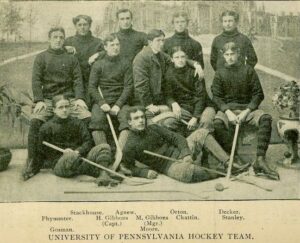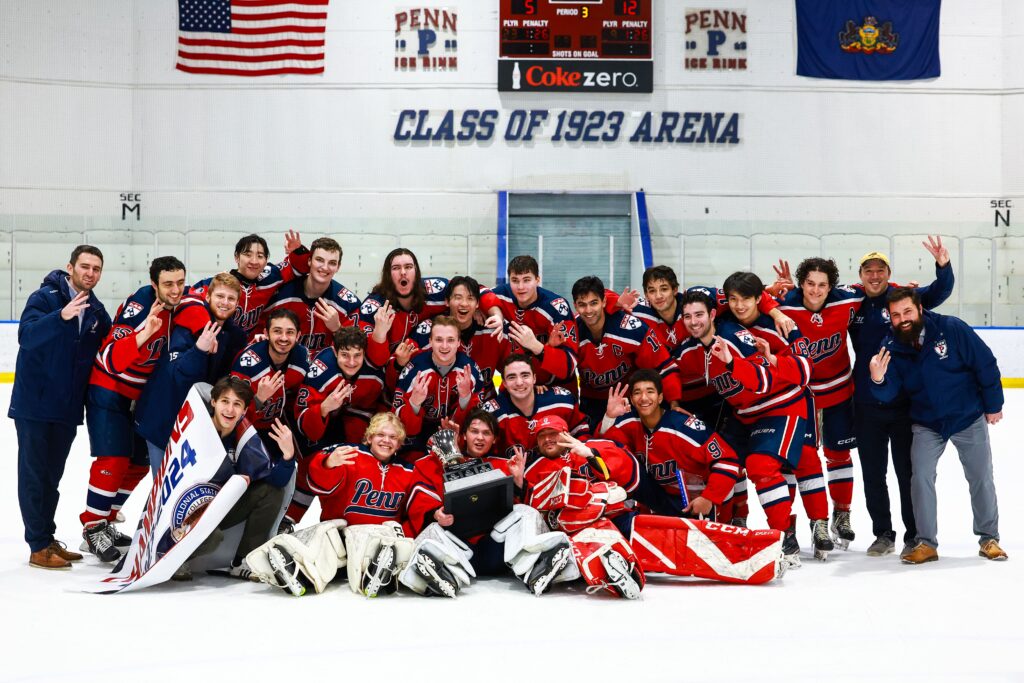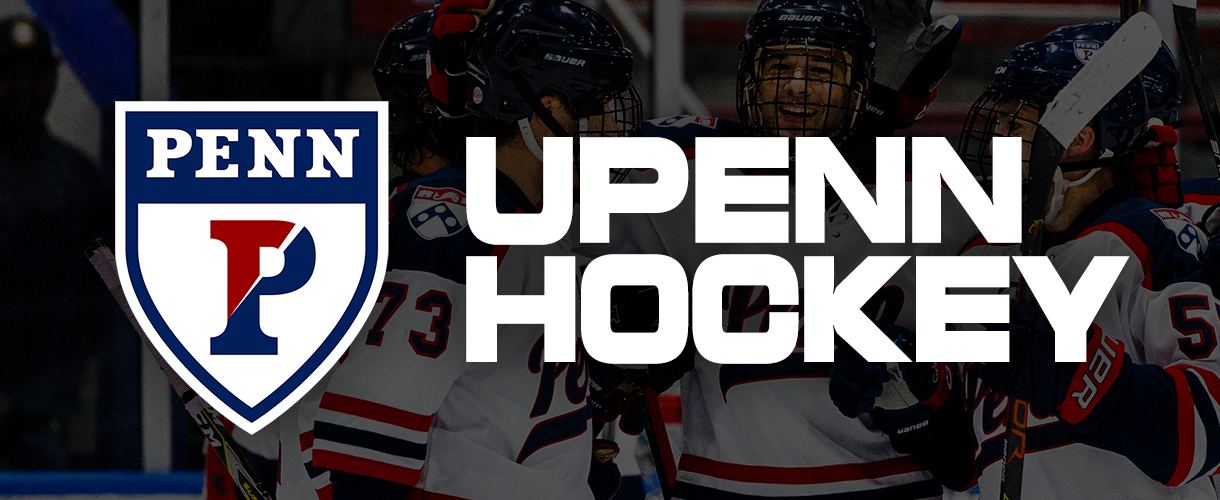Our History

The Early Years
The University of Pennsylvania began playing ice hockey in the winter of 1898 when the Team played as a club sport in a four-team league known as the Intercollegiate Hockey League, which included Yale, Brown and Columbia. That winter, the Team, comprised mostly of sophomores and local Philadelphia residents, amassed a record of two wins and one loss under the leadership of a team captain as coach.
Hockey survived until 1911 when Philadelphia weather forced the Team to participate in only one game. The following season, in 1912, the Team spent the entire year on the road without playing a single home game. Then, beginning in 1920, when Philadelphia welcomed its own professional hockey team to the area the Penn club began to gain exposure and popularity. The Team, however, folded during the 1926-27 season as a result of insufficient funds.
Not until 1941 did Penn once again foray into the hockey world when it entered the Eastern Collegiate Hockey League. During that first season, the Team won the league and enjoyed moderate success until it disbanded because of World War II.
The Team again resurrected itself in the ’50s when, from 1956-1959, it maintained a ten to fifteen game schedule. For the next several years, the Team continued to play an increasingly difficult schedule and, in doing so, progressively worked toward attaining varsity status from the University. In 1964, Jim Salfi, a varsity letter-winning skater who graduated from St. Lawrence earlier that spring, took the reigns of the Red and Blue. After only one club season under Salfi, the University recognized ice hockey as a varsity sport.
Varsity Years
During the 1965-1966 season, the Team’s first campaign as a varsity team, the Quakers amassed a 16-8 record and enjoyed their best season under coach Salfi. The next season, the Team compiled a 13-11 record highlighted by a victory over Dartmouth, the Program’s first win over an Ivy League opponent. Then, in 1968, a group called the “Friends of Pennsylvania Hockey” and the Class of 1923, lead by Howard Butcher III, donated 3.2 million dollars to construct the Class of 1923 Arena.
In 1970-1971, the same season that Penn moved into the state of the art Class of 1923 Arena, the Quakers finished with a record of 14-11 and earned its first ECAC playoff berth. That year,the Team drew an average of 2,000 fans for each of its home games. Notably, one of the Penn skaters on that 1970-1971 Team that christened the Arena was senior defensemen Bob Finke, who later coached the Quakers’ last two varsity seasons.
The Team enjoyed similar success during its 1971-72 campaign, during which the Team finished fourth in the ECAC with a 16-9 record and home ice advantage in the first round of the playoffs. Jim Salfi left Penn after the 1971-72 season and took the head coaching job at RPI.
Robert Crocker, who took the helm of the Quaker team for four seasons beginning in 1972-1973, succeeded Coach Salfi. In his first season at the helm, Crocker, a former assistant at Boston University under Jack Kelley, led the team to a 16-9-2 record, one of the best in the Program’s history. The Team finished that year fourth in an ECAC division of seventeen teams. Although the Team drew defending champion Boston University in the first round of the playoffs, Penn traveled to Boston and handily defeated the Terriers 7-3 in front of a sold out crowd.
End of Varsity
After the success of the 1972-1973 season, the Program began a downward spiral. According to Crocker, the University began to tighten the Team’s budget which, in turn, made recruiting more difficult. As the funding started to dwindle, the level of play suffered, and fan interest dropped. The axe finally fell on the Penn program near the end of the 1977-78 season. During that season, Athletic Director Andy Geiger informed Coach Bob Finke of the University’s plan to drop hockey from varsity status along with gymnastics, golf, badminton, and a professional theatre at Annenberg due to budgetary restraints.
The Undergraduate Assembly organized a rally, after which students stormed College Hall in protest. On the morning of March 2, 1978, one hour of demonstration turned into a four-day sit-in, after which the administration agreed to cut $50,000 from other parts of the University in order to reinstate the golf, badminton and gymnastics programs. Both students and the administration agreed to begin a campaign to raise $125,000 to keep the doors of Annenberg’s professional theatre open. The agreement, however, omitted the reinstatement of varsity ice hockey. Thus, despite valiant efforts from students, the fate of varsity ice hockey at Penn was sealed; varsity hockey at Penn officially ended with a game against rival Cornell on March 4, 1978.
Recent History
From the 1979-1980 season until now, the Team has retained its status as a club sport managed by the University of Pennsylvania Recreation Department. During this time, the Team has enjoyed numerous successes, including several championship appearances. Notably, during the 1999-2000 season, Penn won the Delaware Valley Collegiate Hockey Conference regular season championship and playoff championship.
The following season, Penn moved to the vastly more competitive Mid-Atlantic Collegiate Hockey Association. From 2000-2006 Penn appeared in every MACHA post-season and, in 2002, the Team captured both the MACHA regular season championship and playoff championship. In 2004, the Team won its first ever Liberty Bell Championship. Throughout its years as a club team, the Penn program has produced numerous league all-stars, all-Americans and all-region players.
Today, the Team continues to participate at the Division II level of the American Collegiate Hockey Association, which now boasts five divisions including more than 350 men’s and women’s teams from across the nation. From 2010-2014, the team was a member of the Great Northeast Collegiate Hockey Conference, a 15-team league from the Mid-Atlantic region. Since the 2014-15 season, the team has been part of the Colonial States College Hockey League (CSCHC). In the 2021-2022 season, the team was named the regular season champions and went on to win the CSCHC playoffs where they advanced to ACHA regional tournament and was one win away from advancing to the national tournament. In the 2022-2023 season the Quakers repeated as both regular season and playoff champions, advancing the semi-finals of the regional tournament. The Quakers once again were league champions in the 2023-2024 season securing three consecutive league championships in a row, advancing to the semi-finals of the regional tournament for a third year. The team plays approximately 20 games from September to February, and continues to call the Class of 1923 Arena its home.

